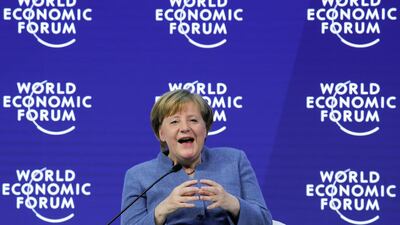The “poison” of populism makes nations turn inward, warned Angela Merkel.
The German chancellor said “right-wing populism” draws the wrong lessons from history and that Germany was "trying to get it under control, but it’s a poison that appears whenever you have unsolved problems,” she said.
Isolationism and protectionism will not lead to a good future, she continued.
Germany will seek to work with other countries to solve issues facing the globe, with Ms Merkel saying that countries who isolate themselves are not constructive.
"We think that shutting ourselves off, isolating ourselves, will not lead us into a good future. Protectionism is not the proper answer," she said, in what could be seen as a veiled criticism of US president Donald Trump who has pursued an America-first policy.
In a wide-ranging special address in Davos, Ms Merkel spoke of her determination to form a German government, support for a multilateral global infrastructure, the need to evolve with the digital age and ensuring that prosperity across the world grows.
Referencing the World Economic Forum’s focus of “creating a shared future in a fractured world”, Ms Merkel talked extensively about bridging the divisions that are growing internationally.
Germany wants to contribute to solve the problems of the world together, she said.
“We believe that if we are of that opinion that things are simply ‘not fair’... then we have to seek multilateral answers to this and not pursue a unilateral protectionist course where we isolate ourselves against others,” she said.
Achieving prosperity will be more achievable if countries cooperate with one another, she said, continuing to warn that there is a “grave danger” that inward-looking countries will be “left behind.”
Reflecting on the UK’s decision to leave the European Union, Ms Merkel said it was “regrettable”.
Ms Merkel, an avid proponent of the EU, told the audience in Davos: “It is interesting although it is obviously regrettable that citizens of the United Kingdom have opted to leave the EU, but at the same time this has encouraged us to concentrate on the big issues.” She also added that she wanted to work to help achieve a good outcome for all in Britain’s exit.
In clear show of support, Ms Merkel said the election of the staunchly pro-EU French president Emmanuel Macron had brought a “new impetus” to the table which “will strengthen us”.
She argued that with support for the EU no longer being unanimous amongst its members, it was a chance for the Union to continue to develop and improve in a number of areas including strengthening the Eurozone and deciphering the ownership of data spread across digital and geographical regions.
Ms Merkel also said a unified front from the EU on issues of foreign policy are also needed if the bloc is to give a consistent and unified response to other large world powers, such as China and the US.
Tackling ISIL and coping with the pressure of mass migration, two big domestic issues for the German politician, would benefit from a more active and unified response from countries across the world, she said.
Looking closer to home, she confirmed that she was looking to form a government as soon as possible. Talks around the formation of the coalition are being guided by the desire to ensure a long-lasting prosperity for Germany and for progress to be made in the country’s adoption of rapidly evolving digital technologies. Germany is Europe’s biggest economy.
__________________
Read more
Davos 2018: Global gathering a chance to choose co-operation over protectionism
Macron hosts 140 chief executives in pre-Davos charm offensive
Germany's SPD backs Merkel coalition talks in crunch vote
__________________
“We are not leading the way in other areas of the digital world, for example the society and the state. Next the few years will be under the heading of let us bring digital into our education system, the state has to be digitised, people have to be able to communicate with their state representatives through digital and a better ecosystem for startups needs to be created so that we can make further progress so that we can again be a cradle of innovation,” she said.
Germany's Social Democrats (SPD) voted on Sunday to begin formal coalition talks with Ms Merkel's conservatives, moving Europe's economic powerhouse one step closer to a stable government after months of political uncertainty and leading the way toward Chancellor Angela Merkel's fourth term.











